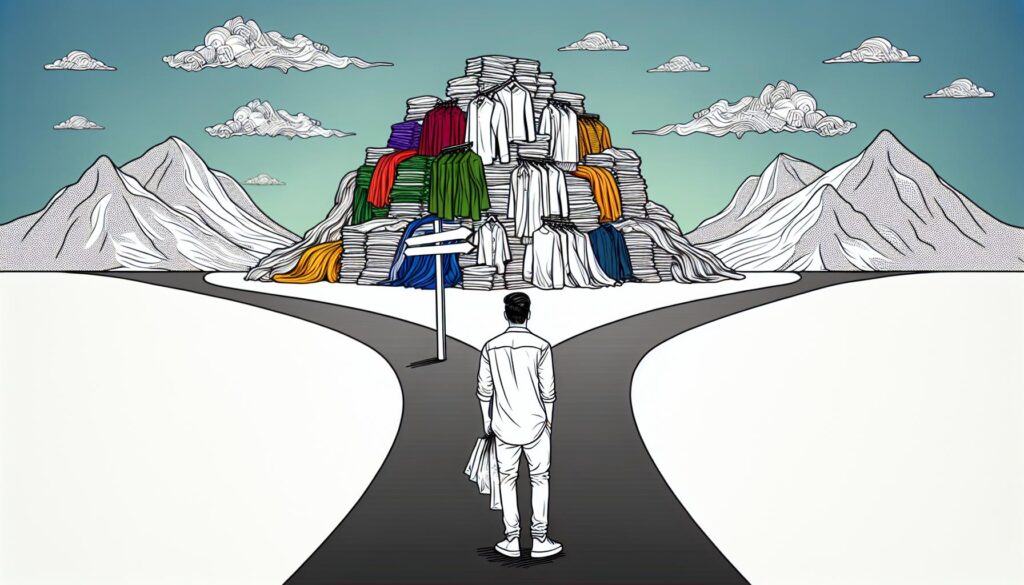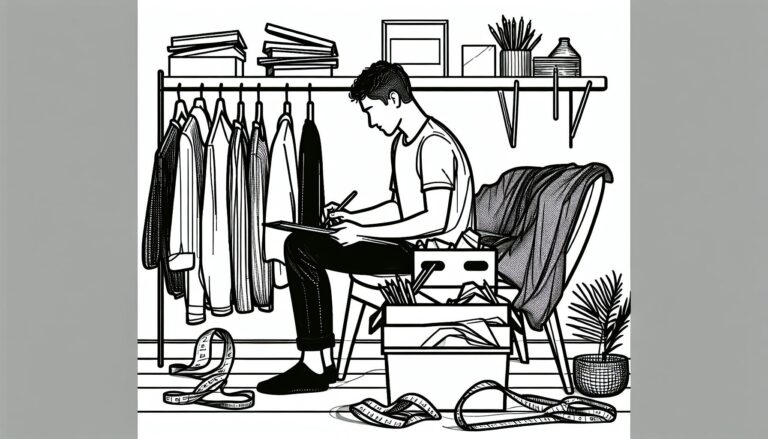As someone deeply passionate about fashion and sustainability, I’ve delved into the captivating world of fast fashion versus minimalist wardrobe choices. The allure of trendy, affordable clothing often masks a darker reality that many consumers overlook. In this article, I’ll uncover the hidden costs behind fast fashion and explore the benefits of embracing a minimalist approach to dressing.
From the environmental impact of mass-produced garments to the ethical concerns surrounding labor practices, the true cost of fast fashion extends far beyond its price tag. By contrast, adopting a minimalist wardrobe not only promotes conscious consumption but also encourages a more sustainable lifestyle. Join me as we delve into the fascinating contrast between these two fashion paradigms.
Environmental Impact of Fast Fashion
Fast fashion has a significant negative impact on the environment due to its large-scale production processes. From the massive amount of water and chemicals used in textile dyeing to the carbon emissions generated by transportation, fast fashion contributes heavily to pollution and resource depletion.
One of the most concerning aspects is the waste it generates. With consumers discarding clothes at an alarming rate, landfills are overflowing with textiles that do not decompose easily, further exacerbating environmental problems.
Additionally, the constant demand for new trends in fast fashion leads to overproduction and overconsumption, which puts a strain on natural resources and perpetuates a cycle of environmental harm.
By understanding the environmental impact of fast fashion, we can make more informed choices about our clothing consumption patterns and their effects on the planet.
Ethical Concerns in Labor Practices
In the fast fashion industry, garment workers often face exploitative working conditions, including long hours, low wages, and lack of job security. Many factories prioritize profit over worker well-being, leading to instances of unsafe workplaces and labor rights violations. As consumers, we must consider the human cost behind the cheap clothing we purchase.
- According to the Clean Clothes Campaign, around 75 million people work to make our clothes, and 80% of them are women.
- Reports of child labor and forced labor in fast fashion supply chains are not uncommon.
- Transparency in the fashion industry regarding labor practices remains a significant issue, making it difficult for consumers to know the origin of their clothes and the conditions under which they were made.
By opting for a minimalist wardrobe and choosing brands with transparent and ethical labor practices, we can support companies that value fair treatment of their workers. Investing in quality, timeless pieces made under ethical conditions not only promotes better labor practices but also leads to a more sustainable and responsible fashion industry.
Hidden Costs Behind Fast Fashion
When we indulge in the allure of fast fashion, the true costs often remain hidden beneath the surface. Garment workers, mostly women, toil in low wages and hazardous conditions to meet the insatiable demand for trendy clothing. The fast fashion industry thrives on quick turnovers and expediency, often at the expense of workers’ well-being.
Child labor and forced labor are grim realities in some fast fashion supply chains. This exploitation tarnishes the entire process of creating the clothes we so casually purchase without a second thought. The lack of transparency within these supply chains shields these unethical practices from public scrutiny, perpetuating a cycle of abuse and neglect.
Environmental degradation is another hidden cost of fast fashion. The pursuit of cheap garments contributes to pollution, excessive water usage, and waste. From harmful chemicals leaching into water sources to landfills filled with discarded clothing, the environmental impact of fast fashion is undeniable.
Consumers must recognize that the price tag on a piece of clothing does not reflect its true cost. It’s imperative to consider the ethical implications behind each fashion purchase and understand the ripple effects of our choices. By shedding light on these hidden costs, we can make informed decisions that support sustainable and ethical practices in the fashion industry.
Benefits of a Minimalist Wardrobe
Transitioning to a minimalist wardrobe offers various advantages that go beyond personal style. By embracing a more simplified approach to clothing, I’ve experienced notable benefits:
- Saves Money: With fewer items to buy and maintain, I spend less on unnecessary purchases, focusing on quality over quantity.
- Reduces Decision Fatigue: Having a streamlined wardrobe means I spend less time deciding what to wear, leading to a more efficient morning routine.
- Promotes Sustainability: By consuming less and choosing timeless pieces, I contribute to reducing the environmental impact of fast fashion.
- Encourages Creativity: Working with a limited selection of clothes challenges me to mix and match items creatively, leading to innovative outfit combinations.
- Fosters Mindfulness: Owning fewer possessions encourages me to be more intentional with clothing choices, supporting a mindful and conscious approach to consumption.
Embracing a minimalist wardrobe not only simplifies my daily life but also aligns me with ethical and sustainable fashion practices, making a positive impact on both my lifestyle and the environment.
Embracing Conscious Consumption
When it comes to the impact of our clothing choices, fast fashion often leads to environmental degradation and exploitative labor practices. By transitioning to a minimalist wardrobe, I embrace a lifestyle of conscious consumption that prioritizes quality over quantity. This shift allows me to invest in timeless pieces that are durable and versatile, reducing the need for frequent replacements and ultimately minimizing waste.
In embracing conscious consumption, I am mindful of the ethical implications of my purchases. By opting for sustainable and ethically-made clothing items, I actively support fair labor practices and environmentally-friendly production methods. This commitment aligns with my values and allows me to contribute positively to the fashion industry by encouraging transparency and accountability.
Moreover, a minimalist wardrobe encourages me to redefine my relationship with fashion. Instead of succumbing to the pressures of seasonal trends and impulse buys, I focus on curating a collection that reflects my personal style and values. This intentional approach not only cultivates a sense of authenticity but also promotes mindful consumption by valuing quality over fleeting trends.
In essence, embracing conscious consumption through a minimalist wardrobe empowers me to make informed choices that have a positive impact on both my lifestyle and the environment. Through sustainable practices and a focus on quality, I contribute to a more ethical and sustainable fashion industry while enjoying the benefits of a curated and timeless collection of clothing.
Key Takeaways
- Fast fashion has a detrimental environmental impact, including pollution, overconsumption, and waste generation.
- Ethical concerns in fast fashion include exploitative labor practices, such as low wages and unsafe working conditions.
- Hidden costs of fast fashion encompass environmental degradation, exploitation of workers, and lack of transparency in the supply chain.
- Embracing a minimalist wardrobe offers benefits like saving money, reducing decision fatigue, and promoting sustainability.
- Transitioning to conscious consumption through a minimalist wardrobe supports ethical labor practices, environmental sustainability, and personal mindfulness in fashion choices.
Conclusion
Transitioning to a minimalist wardrobe offers a sustainable solution to combat the negative impacts of fast fashion. By prioritizing quality over quantity and choosing ethically-made items, we can support fair labor practices and reduce environmental harm. Embracing conscious consumption allows us to redefine our relationship with fashion, focusing on personal style and values. Making informed choices empowers us to contribute to a more ethical and sustainable fashion industry. Let’s continue to make a difference through our clothing choices and create a more positive impact on both our lives and the world around us.



